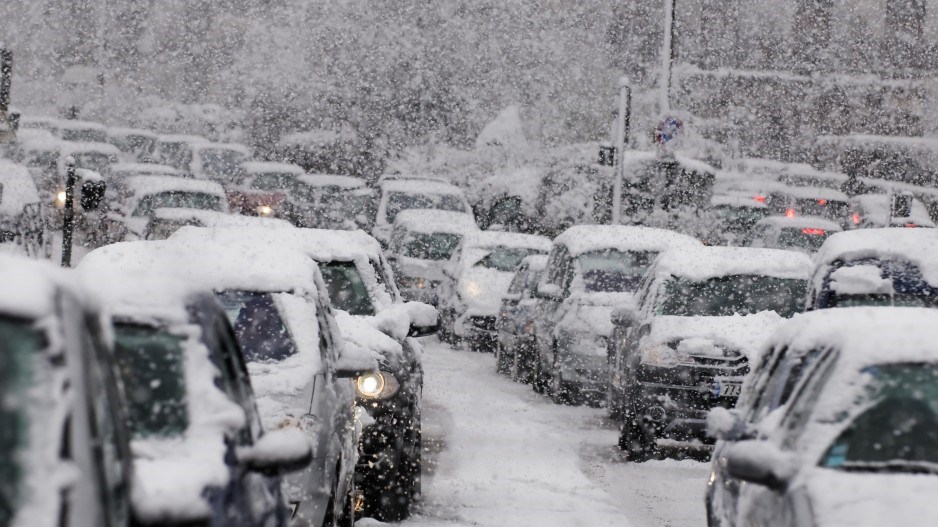Almost three months since a rush-hour snowstorm stranded hundreds, if not thousands, of commuters overnight on bridges and feeder routes, a New Westminster city councillor is disappointed that the idea of a regional snow summit didn’t gain traction.
Coun. Daniel Fontaine and Surrey Coun. Linda Annis proposed a high-level, multiparty meeting about the Nov. 29-30 debacle.
There were more dumps in December and fierce February flurries are forecast for Saturday night. Environment Canada has advised that 10 to 30 centimetres of snow will fall across Metro Vancouver, the Fraser Valley and the Sea to Sky.
Fontaine speculates there are likely internal reviews about brining, salting, sanding and plowing in various jurisdictions, “but it’s all out of public sight.”
“What we could have done better, or areas that we could improve, that was the main thrust and the main purpose behind the summit,” Fontaine said. “Bringing everybody together to discover what happened, and if there are ways for us to prevent it from happening again.”
Documents obtained via freedom of information about the end-of-November storm show key arms of the Ministry of Transportation and Infrastructure and TransLink were not working as a team.
A draft Nov. 29 memo from TransLink CEO Kevin Quinn outlined TransLink’s plans, while appealing for the region’s mayors to muster resources to deal with as much as 25 centimetres of snow.
“To ensure our transit vehicles can travel safely on the roads in the winter weather, I kindly ask that your engineering teams continue to prioritize the clearing and treatment of transit routes, especially major roads, bridges and boulevards that could create bottlenecks for commuters of all modes. TransLink will be focused on rapid identification of trouble spots and will communicate with your staff as needed,” Quinn wrote.
TransLink was calling in extra staff, deploying special anti-icing trucks for trolley wires, replacing articulated buses with standard 40-foot-long buses, running special de-icing cars on the SkyTrain, preparing brass cutters to break ice on trolley wires and “snow socks” to install on bus tires for hilly routes in Vancouver, Burnaby and the North Shore.
TransLink held a mid-afternoon conference call with more than two-dozen managers Nov. 28 to gear up for the next day. The situation was dire by mid-evening Nov. 29.
“All municipalities are having clearing issues – Surrey is critical area. Heavy crowds at Surrey Central. City of Surrey, all snow mitigation assets have been deployed. Heavy delays,” said notes from the 8 p.m. conference call.
Contractors were having issues with traffic and a transit supervisor had been dispatched because coaches were stuck on the Alex Fraser Bridge.
The 6 a.m. conference call notes mentioned 176 stranded buses, 30 of which were abandoned.
“Team has a detailed list of bus locations and if there are passengers/drivers on board.”
“Escalated Concern: Passengers stuck on bus since 8 p.m. last night — everyone is safe and working to get them. Focus on recovery of operators and passengers.”
There had been 30 accidents, with one “pedestrian contact,” but no report of an employee injury. More than 90 operators were unable to come to work. There was an update during the call, that two buses stranded overnight with passengers had been returned.
TransLink is best known for bus, rapid transit, commuter train and SeaBus divisions, but it also oversees 2,600 lane-kilometres of major road network that connect local roads with provincial highways, four vehicle bridges (Knight, Pattullo, Golden Ears and Westham Island) and the Canada Line bike and pedestrian bridge.
Yet the highest-profile problem areas were provincial — Alex Fraser, Port Mann and Queensborough bridges — and provincial staff had nearly 12 hours to react.
“Rapidly accumulating snow will make travel difficult. Visibility may be suddenly reduced at times in heavy snow,” read the forecast in Ministry of Transportation and Infrastructure snow and ice program manager Steve Robertson’s email box at 5:31 a.m. Nov. 29.
Snow and ice teams were mobilized before 9:30 a.m. to monitor the Port Mann and Alex Fraser. Maintenance contractor crews and rope access technicians were sent later. Seven ministry staff and four from contractor Mainroad met at 11:30 a.m. to plot strategy.
But it wasn’t enough, the weather had the upper hand. Next morning, Robertson provided a statistics report to staff.
The snowpack between 2 p.m. and 6 a.m. was 20 cm, but actual snowfall amounts were higher as the snowpack was settling while the snow was falling.
“With the high precipitation rates we saw, I would expect 25-30 cm fell in some areas,” Robertson wrote.
Between 4 p.m. and 7 p.m., it came down at a rate of three to four centimetres per hour, increasing to five to six centimetres per hour, and then seven to 11 centimetres between 7 p.m. and 8 p.m. The accumulations continued until 10:30 p.m.
Port Mann temperatures started at -2.5 Celsius and ended at 0.5 Celsius when precipitation stopped in the morning. High winds, throughout the first three-quarters of the event, were steady from the east at 30-40 kilometres per hour, gusting to 60 kilometres per hour between 2 p.m. and 10:30 p.m.
“This blowing snow greatly affected the roads by reducing visibility and depositing snow drifts on the roads,” Robertson wrote.
Meanwhile, the NDP government’s freedom of information office has decided to delay the release of internal correspondence about the pre-Christmas storm response in the Lower Mainland and the Christmas Eve bus crash that killed four people on the Okanagan Connector until March 21 and March 28, respectively.




